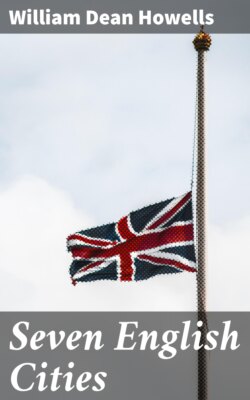Читать книгу Seven English Cities - William Dean Howells - Страница 9
На сайте Литреса книга снята с продажи.
I
ОглавлениеTable of Contents
These hotels are, next to the cathedrals, perhaps the greatest wonder of England, and in Manchester the railway hotel is in some ways more wonderful than the cathedral, which is not so much planned on our native methods. Yet this has the merit, if it is a merit, of antedating our Discovery by nearly a century, and pre-historically it is indefinitely older. My sole recorded impression of it is that I found it smelling strongly of coal-gas, such as comes up the register when your furnace is mismanaged; but that is not strange in such a manufacturing centre; and it would be paltering with the truth not to own a general sense of the beauty and grandeur in it which no English cathedral is without. The morning was fitly dim and chill, and one could move about in the vague all the more comfortably for the absence of that appeal of thronging monuments which harasses and bewilders the visitor in other cathedrals; one could really give one’s self up to serious emotion, and not be sordidly and rapaciously concerned with objects of interest. Manchester has been an episcopal see only some fifty years; before that the cathedral was simply T’ Owd Church, and in this character it is still venerable, and is none the less so because of the statue of Oliver Cromwell which holds the chief place in the open square before it. Call it an incongruity, if you will, but that enemy of episcopacy is at least not accused of stabling his horses in The Old Church at Manchester, or despoiling it of its sacred images and stained glass, and he merits a monument there if anywhere.
With the constantly passing trams which traverse the square, he is undoubtedly more significant of modern Manchester than the episcopacy is, and perhaps of that older Manchester which held for him against the king, and that yet older Manchester of John Bradford, the first martyr of the Reformation to suffer death at the stake in Smithfield. Of the still yet older, far older Manchester, which trafficked with the Greeks of Marseilles, and later passed under the yoke of Agricola and was a Roman military station, and got the name of Maen-ceaster from the Saxons, and was duly bedevilled by the Danes and mishandled by the Normans, there may be traces in the temperament of the modern town which would escape even the scrutiny of the hurried American. Such a compatriot was indeed much more bent upon getting a pair of cotton socks, like those his own continent wears almost universally in summer, but a series of exhaustive visits to all the leading haberdashers in Manchester developed the strange fact that there, in the world-heart of the cotton-spinning industry, there was no such thing to be found. In Manchester there are only woollen socks, heavier or lighter, to be bought, and the shopmen smile pityingly if you say, in your strange madness, that woollen socks are not for summer wear. Possibly, however, it was not summer in Manchester, and we were misled by the almanac. Possibly we had been spoiled by three weeks of warm, sunny rain on the Welsh coast, and imagined a vain thing in supposing that the end of August was not the beginning of November.
